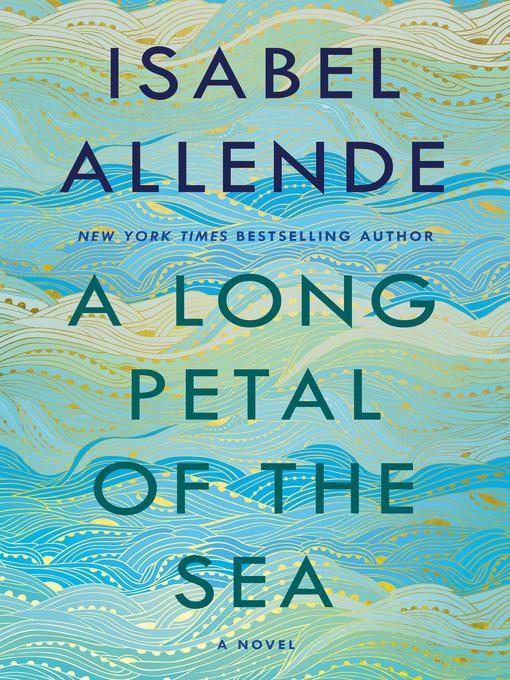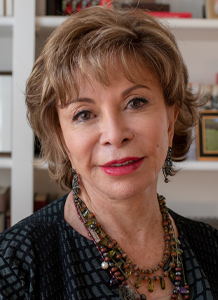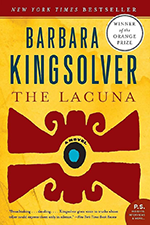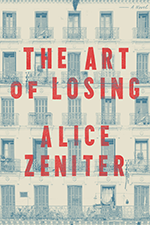 A Long Petal of the Sea
A Long Petal of the Sea
by Isabel Allende
GENRE: Historical Fiction, Literary Fiction
A story of love, belonging, and what it means to call somewhere home. Beginning in the midst of the Spanish Civil War, pregnant young widow Roser and her brother-in-law Victor are exiled from their ravaged homeland and make their way to Chile in search of a new life.
 Author Biography
Author Biography
Isabel Allende—novelist, feminist, and philanthropist—is one of the most widely-read authors in the world, having sold more than 75 million books. Chilean born in Peru, Isabel won worldwide acclaim in 1982 with the publication of her first novel, The House of the Spirits, which began as a letter to her dying grandfather. Since then, she has authored more than twenty five bestselling and critically acclaimed books, including Daughter of Fortune, Island Beneath the Sea, Paula, The Japanese Lover, A Long Petal of the Sea and her most recent memoir, The Soul of a Woman. Translated into more than forty two languages, Allende’s works entertain and educate readers by interweaving imaginative stories with significant historical events.
In addition to her work as a writer, Allende devotes much of her time to human rights causes. In 1996, following the death of her daughter Paula, she established a charitable foundation in her honor, which has awarded grants to more than 100 nonprofits worldwide, delivering life-changing care to hundreds of thousands of women and girls. More than 8 million have watched her TED Talks on leading a passionate life.
She has received fifteen honorary doctorates, including one from Harvard University, was inducted into the California Hall of Fame, received the PEN Center Lifetime Achievement Award, and the Anisfield-Wolf Lifetime Achievement Award. In 2014, President Barack Obama awarded Allende the Presidential Medal of Freedom, the nation’s highest civilian honor, and in 2018 she received the Medal for Distinguished Contribution to American Letters from the National Book Foundation. She lives in California. - Author's website
Booklist
/* Starred Review */ Isabel Allende joins an illustrious group of novelists who have found a deep wellspring for fiction in the Spanish Civil War (1936-1939), beginning with Ernest Hemingway’s eye-witness-inspired For Whom the Bell Tolls, which was published just a year after those who were fighting to save an elected government were defeated by fascist forces under General Francisco Franco, who was allied with Hitler and Mussolini. Hemingway covered the war, along with his third-wife-to-be Martha Gellhorn, and both appear in Beautiful Exiles (2018) by Meg Waite Clayton and Love and Ruin (2018) by Paula McLain. Distinguished Spanish writer Manuel Rivas’ The Carpenter’s Pencil (2001) is a deeply inquisitive and moving novel about the war, as are Alan Furst’s Midnight in Europe (2014), The Time in Between (2011) by Maria Duenas (translated by Daniel Hahn), and Mary Gordon’s There Your Heart Lies (2017). Now Helen Janeczek, in The Girl with the Leica (2019), and Allende explore the seismic impact on individual lives of Spain’s devastating civil war in novels strikingly divergent in style and focus.Poet Pablo Neruda plays a small but key role in Janeczek’s novel when he rescues two thousand Spanish war refugees and brings them to Chile. This actual voyage of mercy is the catalyst for Isabel Allende’s A Long Petal of the Sea. Internationally revered as a virtuoso of lucidly well-told, utterly enrapturing fiction, Allende encapsulates the complicated horrors of the Spanish Civil War within the epic struggles of Victor Dalmau, the son of a music professor and an activist, and Roser Bruguera, a gifted student of Victor’s father who falls in love with Victor’s brother, a soldier, and is left bereft and pregnant when he’s killed. Roser and Victor, destined to become a doctor after a stunning battlefield encounter, join the desperate exodus to France, where Spanish refugees are maligned as filthy criminals and detained in unconscionably wretched circumstances. When events deliver them to Neruda as he’s selecting passengers for his sanctuary ship, they expediently marry to ensure their inclusion. Allende follows the course of their tumultuous, socially conscious lives, forever shadowed by the war’s traumas, over the ensuing decades, contrasting their successful professional and unusual private lives with the hard slam to the right of Chilean politics as a U.S.-backed military coup takes down President Salvador Allende (a cousin of the author) and installs the dictator Augusto Pinochet. Once again, Victor is subjected to brutality in a concentration camp; once again he and Roser must flee their home. Allende deftly addresses war, displacement, violence, and loss in a novel of survival and love under siege, a tale that is seductively intimate and strategically charming with valor, perseverance, transcendent romance, and wondrous reunions providing narrative sweeteners to lure readers into contemplation of past atrocities and, covertly, of the disturbingly similar outrages of the present, in which refugees and immigrants are treated with appalling cruelty and fascist threats escalate around the warming world. -- Donna Seaman (Reviewed 10/1/2019) (Booklist, vol 116, number 3, p24).
Kirkus Reviews
Two refugees from the Spanish Civil War cross the Atlantic Ocean to Chile and a half-century of political and personal upheavals.We meet Victor Dalmau and Roser Bruguera in 1938 as it is becoming increasingly clear that the Republican cause they support is doomed. When they reunite in France as penniless refugees, Roser has survived a harrowing flight across the Pyrenees while heavily pregnant and given birth to the son of Victor's brother Guillem, killed at the Battle of the Ebro. Victor, evacuated with the wounded he was tending in a makeshift hospital, learns of a ship outfitted by poet Pablo Neruda to take exiles to a new life in Chile, but he and Roser must marry in order to gain a berth. Allende (In the Midst of Winter, 2017, etc.) expertly sets up this forced intimacy between two very different people: Resolute, realistic Roser never looks back and doggedly pursues a musical career in Chile while Victor, despite being fast-tracked into medical school by socialist politician Salvador Allende (a relative of the author's), remains melancholy and nostalgic for his homeland. Their platonic affection deepens into physical love and lasting commitment in an episodic narrative that reaches a catastrophic climax with the 1973 coup overthrowing Chile's democratically elected government. For Victor and Roser, this is a painful reminder of their losses in Spain and the start of new suffering. The wealthy, conservative del Solar family provides a counterpoint to the idealistic Dalmaus; snobbish, right-wing patriarch Isidro and his hysterically religious wife, Laura, verge on caricature, but Allende paints more nuanced portraits of eldest son Felipe, who smooths the refugees' early days in Chile, and daughter Ofelia, whose brief affair with Victor has lasting consequences. Allende tends to describe emotions and events rather than delve into them, and she paints the historical backdrop in very broad strokes, but she is an engaging storyteller. A touching close in 1994 brings one more surprise and unexpected hope for the future to 80-year-old Victor.A trifle facile, but this decades-spanning drama is readable and engrossing throughout. (Reviewed 09/02/2019)
Library Journal
On September 3, 1939, the S.S. Winnipeg arrived in Valparaiso, Chile, with 2,200 refugees fleeing the fascist regime of Francisco Franco. Allende (The House of the Spirits) befriended one of these refugees, Victor Pey Casado, when she herself was living in exile in Venezuela, and places their struggles at the heart of this masterful historical saga. The novel begins with Victor Dalmau serving as a medic on the Republican side of the Spanish Civil War. After Franco prevails, Victor flees with Roser Bruguera, the pregnant girlfriend of his brother, who died in battle, and marries her "in name only" so they can get prized spots on the Winnipeg; the Winnipeg evacuation was organized by Pablo Neruda, whose description of Chile--long petal of sea and wine and snow--Allende borrows for her title. After arriving in Chile, Victor and Roser together raise Roser's son, Marcel. However, when the Chilean military overthrows the government led by Victor's friend, President Salvador Allende (real-life cousin of the author's father), the family must go on the move again. VERDICT Narrator Edoardo Ballerini renders the cast of well-drawn, colorful characters Technicolor vivid, and his nuanced reading of Allende's lyrical prose and her seamless blend of the historical and the fictional add to the pleasure of this inspiring story. For all literary collections.--Beth Farrell, Cleveland State Univ. Law Lib.
Publisher's Weekly
/* Starred Review */ Spanning from 1938 to 1994, this majestic novel from Allende (In the Midst of Winter) focuses on Victor Dalmau, a 23-year-old medical student fighting in the Spanish Civil War on the Republican side when the novel opens. After Nationalist forces prevail, Victor and thousands of other Republican sympathizers flee Spain to avoid brutal reprisals. In France, he searches the packed refugee camps for Roser Bruguera, who is pregnant with his brother Guillem’s child. Once he finds Roser, he breaks the news that Guillem has died in battle and that he has won a place on the Winnipeg, a ship that the Chilean poet Pablo Neruda has organized to transport Spanish refugees from Europe, where WWII is breaking out, to safety in Chile. Allowed to bring only family with him, Victor persuades Roser to marry him in name only. Though Victor has a brief, secret affair with well-off Ofelia del Solar, he begins to fall in love with Roser; they raise Roser’s son, Marcel, together and build stable lives, he as a cardiologist and she as a widely respected musician. But when the Pinochet dictatorship unseats Chile’s Marxist president in 1973, they find themselves once more endangered by their political views. Allende’s assured prose vividly evokes her fictional characters, historical figures like Neruda, and decades of complex international history; her imagery makes the suffering of war and displacement palpable yet also does justice to human strength, hope and rebirth. Seamlessly juxtaposing exile with homecoming, otherness with belonging, and tyranny with freedom, the novel feels both timeless and perfectly timed for today. (Jan.) --Staff (Reviewed 10/07/2019) (Publishers Weekly, vol 266, issue 40, p).
 The Lacuna
The Lacuna
by Barbara Kingsolver
Born in America and raised in Mexico, Harrison Shepherd is a liability to his social-climbing flapper mother, Salome. When he starts work in the household of Mexican artists Diego Rivera and Frida Kahlo - where the Bolshevik leader, Lev Trotsky, is also being harboured as a political exile - he inadvertently casts his lot with art, communism and revolution. A compulsive diarist, he records and relates his colourful experiences of life with Diego Rivera, Frida Kahlo and Trotsky in the midst of the Mexican revolution. A violent upheaval sends him back to America; but political winds continue to throw him between north and south, in a plot that turns many times on the unspeakable breach - the lacuna - between truth and public presumption.
 The Shadow King
The Shadow King
by Maaza Mengiste
Tending the wounded when her nation is invaded by Mussolini, an orphaned servant in 1935 Ethiopia helps disguise a gentle peasant as their exiled emperor to rally her fellow women in the fight against fascism.
 The Art of Losing
The Art of Losing
by Alice Zeniter
Naïma knows Algeria only by the artifacts she encounters in her grandparents’ tiny apartment in Normandy: the language her grandmother speaks but Naïma can’t understand, the food her grandmother cooks, and the precious things her grandmother carried when they fled. Naïma’s father claims to remember nothing; he has made himself French. Her grandfather died before he could tell her his side of the story. But now Naïma will travel to Algeria to see for herself what was left behind—including their secrets.
The Algerian War for Independence sent Naïma’s grandfather on a journey of his own, from wealthy olive grove owner and respected veteran of the First World War, to refugee spurned as a harki by his fellow Algerians in the transit camps of southern France, to immigrant barely scratching out a living in the north. The long battle against colonial rule broke apart communities, opened deep rifts within families, and saw the whims of those in even temporary power instantly overturn the lives of ordinary people. Where does Naïma’s family fit into this history? How do they fit into France’s future?